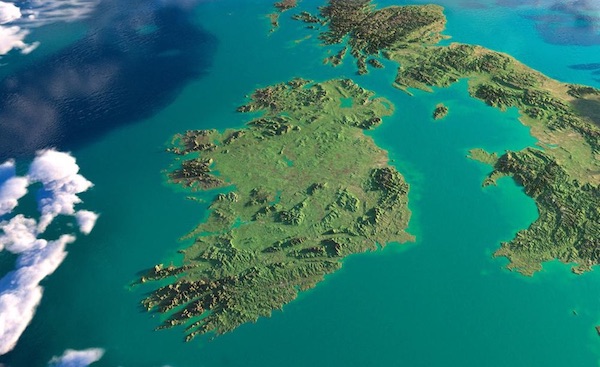
By Colin Harvey (for RTE)
The term “nationalism” is much used and discussed. In the north, it is adopted as convenient shorthand for those who support, work and vote for Irish reunification. It is an odd concept, and one that many are often keen to avoid, due to its associations (in its narrow dimensions) with exclusive forms of identity politics. That is why “civic” is often bolted on to signify something qualitatively different.
Although widely deployed when referring to the politics of this island, the term is at times intriguingly ill-suited to the sort of constitutional politics that has emerged around Irish unity. For example, many Irish citizens in the north who are campaigning for parity of esteem, mutual respect and unity sound much more like critical cosmopolitan globalists, whose politics is anchored in a subtle blend of citizenship goals and human rights protections. “Nationalism” simply does not capture this politics. “Republicanism” works a bit better, but still misses vital components.
Of course, people will continue to use these terms, but the risk remains that something significant can be missed. Taken together with the drama of Brexit, this is giving birth to a version of transformative politics that chimes with the views of those from the past and present who were and are disappointed by the equality and rights performance of both entities on the island. Northern nationalism in particular has captured much of this political ground, with the practical consequence that unionism may increasingly look and sound like a relic of an age that most are horrified by.
There is little necessarily new in this, but it does reconnect the conversation to those radical and lost voices on this island who felt that we could and should do better. This is likely to frame the constitutional discussions to come (particularly within nationalism and republicanism), including debates around post-Brexit life on the island. There will be tensions, but there is an emerging sense that the transformative aspects of the unity argument are likely to prove attractive to a growing body of opinion in the north.
Brexit has inevitably invited reflection about the constitutional future of this island. None of it negates the imperative of being alive to the totality of relationships. But it is a discussion that must be permitted to advance if those already sceptical about delivery of the promises of peace are not to lose faith entirely. People forget that the Good Friday Agreement is a democratically endorsed constitutional compromise with the “principle of consent” at its heart.
Much effort continues to ignore this fact or deflect attention on to other matters. Petty party politics is a depressingly large feature of this. The most unnerving contributions exhibit sneering condescension towards those who take fundamental constitutional questions seriously. As if there is some notional pragmatic ground free from these presumed distractions about this island. No such space exists; in the north, it is generally code for a version of the constitutional status quo, which is just a softer version of unionism. In its worst forms it is camouflage for a “plague on all houses” rhetoric where people disguise their own preferences and can result in lazy euphemisms that promote a general fear of speaking truth to power. Better to acknowledge that Brexit invites consideration of these fundamental questions and explore the options responsibly.
A way forward that is attracting more attention is Irish unity. It is a debate that is now conceived in new terms: it is being reframed as a way of staying in the EU or as a way back. This is part of a growing narrative that is increasingly human rights based in nature. People could, for example, be given the chance to reject the oppressive narratives swirling around Brexit Britain and align with a radically different vision of a unified and reconciled Ireland.
This is not to erase the challenges for both parts of the island. They are works in progress, and the flaws in each are well known. But the Good Friday Agreement contains the basis for a rethink, and one that could be anchored in sensible planning for the next 100 years. That should be an energising project that will encourage people, in all parts of the island, to participate in detailed thought about the future of our shared island. Propositions will have to be advanced and this has the potential to be a transformative dialogue.
Whatever the eventual outcome of the concurrent referendums, the next phase of development on this island will be better informed. Unionism will have to put forward arguments that will travel beyond existing constituencies as unionist votes alone may not suffice to get to the required majority. Nationalism will have to make an informed offer to unionism (and all those in the north) about what the future will bring.
Rather than present this as an anxious and fear-filled constitutional conversation, why not imagine it as a novel experiment in democratic persuasion? For example, it is hard to believe that a vote against Irish unity in the north will result in an unchanged legal and political picture. At present, those advocating for Irish unity have seized the ground of the “rainbow nation”, with unity as a solution to some of the equality, social justice and rights-based challenges we face. Will unionism confine itself to scaring people about unification or will it be a little more creative? Could this ultimately be a win-win conversation for the island?
The Good Friday Agreement contains a people’s vote mechanism that could ensure a future together on this island within the EU. It should annoy no one to point this out. That is not to ignore the real risks, but it is to suggest that we have an opportunity to experiment with a different future - a future where we learn all the lessons from the last 100 years and where we bring the main division on our island to an agreed end.
![[Irish Republican News]](https://republican-news.org/graphics/title_gifs/rn.gif)
![[Irish Republican News]](https://republican-news.org/graphics/title_gifs/harp.gif)

